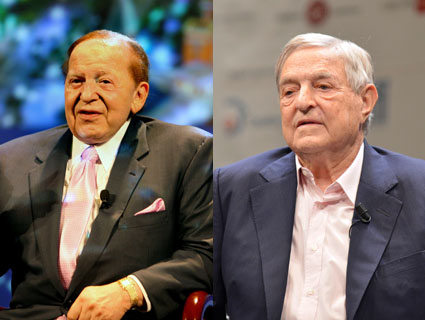
<a href="http://www.shutterstock.com">Collina</a>/Shutterstock
Charles Spies has seen the future of American elections, and it is drenched with super-PAC cash—much of it aimed at getting single politicians elected.
That’s what Spies told me recently when I asked him to peer into his crystal ball and venture a prediction about the future of big-money politics in America. Spies (rhymes with “cheese”) is a well-connected Republican lawyer and former top adviser to Mitt Romney’s 2008 campaign. For the last election cycle, however, Spies choose to support Romney’s presidential bid in a new way: He started a super-PAC.
Restore Our Future, the super-PAC Spies launched with two other Romney ’08 alums, strategist Carl Forti and ad man Larry McCarthy, spent $161 million—the most of any super-PAC—to help elect Romney president, mostly by blasting President Obama with negative ads. Spies’ candidate, of course, lost, but his experience running Restore Our Future taught him a thing or two about the strange, rapidly changing new world of super-PACs.
Super-PACs may have spent $635 million during the 2012 elections, but that’s chump change compared to what they’ll likely unload in the next presidential election. (Only 45 months away!) Ditto for the 2014 midterm elections compared to the 2010 midterms. Spies predicts at least 250 new super-PACs will spend serious money on races up and down the ballot in 2014. And he says voters should expect a lot of them to be devoted to promoting the fortune of a single House or Senate candidate, big-money bazookas firing away to nudge their preferred politician that much closer to Washington.
Spies is far from the only political expert predicting this super-PAC-filled future. Neil Reiff, an election lawyer who used to work at the Democratic National Committee, says any candidate running for Congress or the White House begins his or her campaign with a checklist. Now more than ever, a super-PAC will be high on those candidate checklists. As Reiff sees it, a super-PAC is not a novelty anymore, as it was in 2010 and 2012. It’s a necessity.
Spies agrees. The 2012 elections opened incumbents’ eyes to how powerful a well-run, deep-pocketed super-PAC can be. “No matter how safe of a district that you are in, having a super-PAC set up is a great way to deter a primary challenger,” he says.
The likely proliferation of super-PACs, he adds, just might make it easier for incumbents to play to the middle. Instead of pandering to the fringes of the Democratic or Republican parties, causing candidates to twist themselves into knots and say things that could later damage them in a general election (see: Romney, Mitt), a politician could skip flirting with the ideologues, knowing that big-spending super-PAC will swoop in with air cover in the event party hardliners mount a serious primary assault. “A member that knows there is a super-PAC supporting him or her against a primary challenge has the flexibility to be more moderate,” Spies says.
But even if Spies’s theory turns out to be true, don’t think that means that we’re likely to see quieter, more genteel campaigns. In 2012, the onslaught of super-PAC spending fueled an all-out war over the airwaves, with super-PACs and other outside groups clogging up commercial breaks in Ohio, Virginia, Colorado, and other battleground states. Restore Our Future and the pro-Obama Priorities USA Action, the presidential race’s two main single-candidate super-PACs, spent $90 million on 113,978 TV ads in 96 media markets between April 11 and October 29, according to the Wesleyan Media Project, which tracks political advertising. And that’s just at the very top of the ballot: Super-PACs spent hundreds of millions more in congressional, senatorial, and other state-level races across the country.
And as the number of super-PACs has climbed, from 83 in late 2010 to almost 1,300 two years later (PDF), the number of nasty campaign ads has skyrocketed. Here’s a snapshot: During the 2012 presidential primary season, 70 percent of all campaign ads were negative. That’s a 750 percent increase from the 2008 presidential race. That sevenfold jump can’t entirely be blamed on super-PACs—the candidates’ campaigns ran lots of negative ads, too—but they played a significant part.
Mud-slinging comes naturally to super-PACs. Because they technically can’t coordinate with candidates, it is far harder for a super-PAC to produce the kind of feel-good campaign ad that resonates with voters. Spies, for instance, couldn’t sit down with Mitt Romney and record a warm conversation, or ask the candidate or his campaign to provide sepia-toned family archival footage. That would have been considered illegal collaboration. But it’s easy and totally legal, Spies explains, to craft a bruising, effective negative ad.
Michael Franz, a codirector of the Wesleyan Media Project, agrees that the spike in super-PACs will bring nastier campaigns. “It’s going be the case that the more super-PACs invest in elections, the more negative those elections will be,” he says. “They’re the ones doing the dirty work.”
Meanwhile, Washington’s “reformers,” the activists and lawyers who want tighter regulations on campaign cash, are bracing for war. They see the rise of single-candidate super-PACs as a threat to our political system and an affront to election law. The reformers want the Federal Election Commission, the nation’s beleaguered campaign watchdog, to crack down on the seemingly cozy ties between super-PACs and candidates. Fred Wertheimer, who runs the pro-regulation group Democracy 21, says single-candidate super-PACs are mere appendages of the campaigns themselves, and so allow donors to sidestep federal contribution limits and “launder” unlimited campaign cash to candidates. “Candidate-specific super-PACs,” Wertheimer says, “are a dangerous fraud on the American people.”
Yet the FEC has shown no interest in cracking down. Recently, the FEC’s six commissioners—by law, three Democrats and three Republicans—deadlocked on whether to investigate a super-PAC created and bankrolled by the mother of Laura Ruderman, a Democrat who in 2012 ran for a House seat in Washington state. Ruderman’s mom’s super-PAC was devoted solely to elect Ruderman, and, naturally, mother and daughter spoke often throughout the campaign.
If any case screamed “coordination” and warranted an investigation, some reformers argue, this was it. But the FEC’s 3-3 deadlock gives a tacit thumbs-up to future super-PACs with mother-daughter, father-son, brother-sister combinations.
“It paves the way for the trouble-free proliferation of super-PACs,” Neil Reiff says. After all, if the FEC can’t agree that a mother- or brother-run super-PAC is out of bounds, what are the chances they’ll find any single-candidate super-PAC, whether run by a trusted adviser, lawyer, campaign operative, or closely tied lobbyist, steps over the line?












